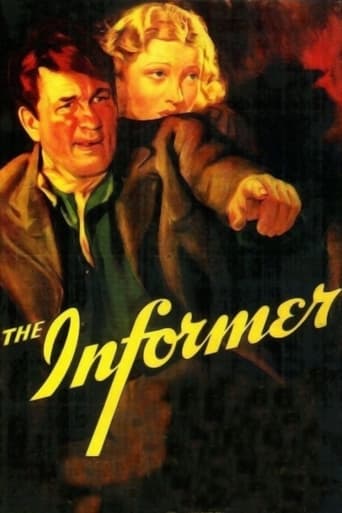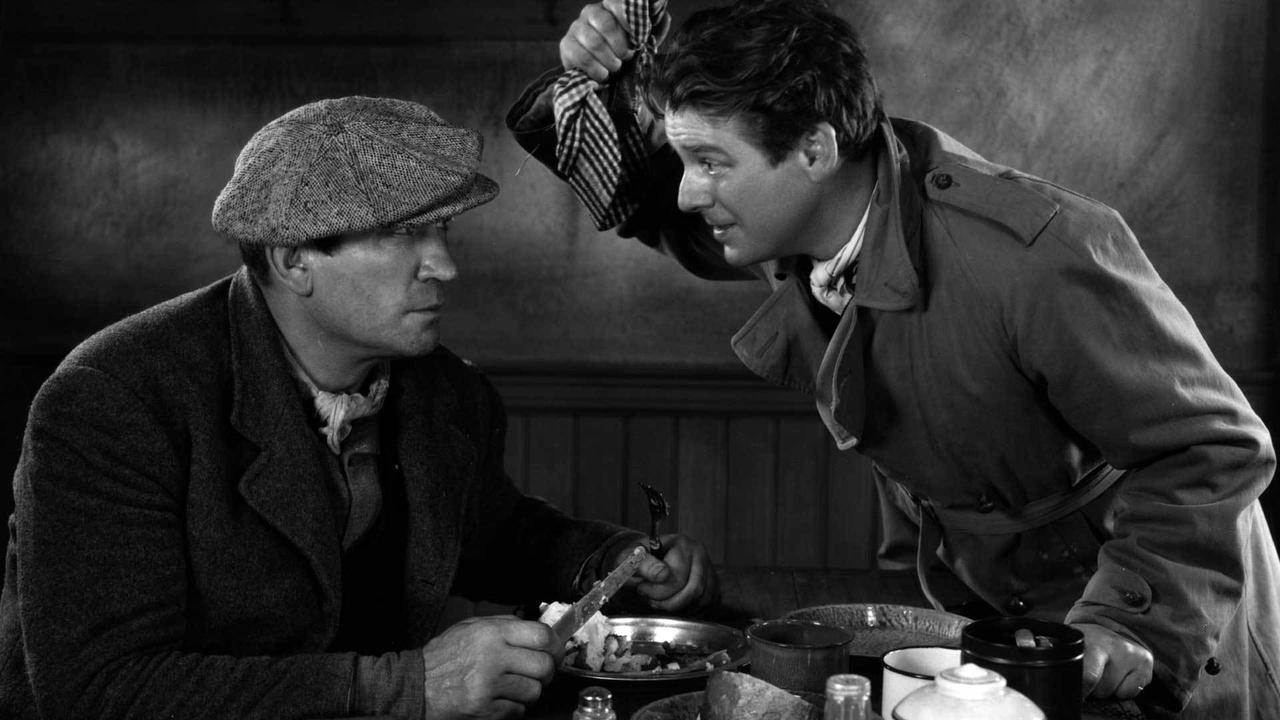gavin6942
Dublin, 1920. Gypo Nolan, strong but none too bright, has been ousted from the rebel organization and is starving. When he finds that his equally destitute sweetheart Katie has been reduced to prostitution, he succumbs to temptation and betrays his former comrade Frankie to the British authorities for a 20 pound reward.Along with Mutiny on the Bounty, The Informer was a big contender at the 8th Academy Awards, competing directly in all six categories they were nominated for (though Mutiny got eight nominations in total, given its ridiculous three Best Actor nominations). Though Mutiny on the Bounty ended up winning Best Picture, The Informer did win every other nomination, including Best Film Editing; Best Director for Ford, Best Actor for McLaglen, Best Writing Screenplay for Nichols, and Best Score. Well done regarding the Best Actor win, which was clearly an uphill battle.For many people, John Ford is best associated with westerns, or "Stagecoach" or John Wayne. And that is very fair. But before any of these, he had success with "The Informer". Ford, although born in America, was very proud of his Irish roots, and it is not surprising he would take on this project, along with a few other Irish-themed choices. His passion is clearly evident in the material.
tostinati
Like many people here, I started out finding my patience being tried by this film. By the end, I actually shed a few tears.It seems to be in the nature of most old films to drag for 7/8th length and then catch fire right at the end. Older film-goers learned to bide their time patiently through the slow parts, calm in the knowledge that the big payoff is on the way. But that isn't quite accurate. You see, to earlier audiences, what are to us the "slow parts" were the main body of the story. They watched and found anecdotal and thematic interest there. Modern audiences, post-Spielberg, are in a constant state of waiting to be hit with a small climax every two minutes when they see older films. It's the inflation problem of modern movies. Well, that isn't going to happen. It is not necessary to apologize for these films; it is simply that you have to adjust your expectations and personal rhythm when you watch them. At this point, the difference between Avatar and The Informer is like the difference between Euripides and a traveling production of Rent. Think about it for a minute or two. Not to strain at the obvious, but Euripides still deserves a hearing.The "exciting part", for most modern viewers, begins with the IRA tribunal scene and escalates to the final couple of minutes, which, if you are at all on board or even paying attention by that time, will tear your heart out. It's not some high-tone universal abstract plea for forgiveness; it's a plea from one dimwit, and those who feel sorry for the big lummox, for a little mercy. It's that personal, and that embarrassingly naked an appeal. For after being mad at Gypo, irritated at him, thinking this is the dumbest character of all time, you finally find yourself won over by the scene of Gypo's erstwhile girlfriend pleading to another woman to talk her man into going easy on him. The film may be sentimental, but the sentimentality is not cheap as some here have charged. There's a matter of life and death that plays out here, and as long as you take the proposition of one life to a customer seriously, it's sentimentality wrung out of the most serious stuff.8 of 10. And the fault for it not being 10 of 10 is my own and in some measure yours, if you are reading this. We have all asked for more, ever more, faster, ever faster until we cannot put ourselves in 1935 -- just yesterday, really -- as easily as we should be able.
barbb1953
Maybe it's because I looked up the history of the Irish troubles in the 1920s and then the sad Civil War that engulfed the Free State after the signing of the treaty before watching this movie. Anyway, the sudden turn at the end brought tears to my eyes.Victor McLaglen isn't as famous today as he was back then, and he should be better remembered. In this film, I think he's playing himself as he would have been without his innate talent and brains. For example, the scenes where his buddy in the crowd is challenging men to fight with him is probably quite reminiscent of what McLaglen actually did in earlier years, when he was a world-class bare-knuckles boxer. John Ford is partly responsible for that; the IMDb trivia section shows how he tricked McLaglen into getting a really bad hangover for the trial scene. This director also could bring out a lot in his actors, even without such tricks. Mostly, though, McLaglen is firmly in control, especially when his character is almost totally blotto (which is difficult for an actor to do believably), and he also plays Gypo Nolan with a depth and emotional power that is surprising for someone who has only seen McLaglen later in his career, in "The Quiet Man." I especially like the contrast between this role as an IRA man and the much more obviously controlled performance he gave as the IRA man Denis Hogan in "Hangman's House." In "The Quiet Man," of course, McLaglen is a country squire at odds with the local IRA. Victor McLaglen was big and bully, in the old-fashioned sense of the word, but he was a good actor, too, and capable of wide range and fine nuances of performance that we just wouldn't expect of a such a man today. It's a rather sad comment on our own set of expectations and prejudices.Ford, as usual, packs a lot into a little bit of film. All the characters are excellent (though the Commandant's mostly American accent is distracting) -- NOTE: There be spoilers ahead! -- Knowing that Gypo once drew the short straw and was ordered to kill a man but let him talk his way out of it instead, we really empathize with the man who draws the short straw for executing Gypo, and the humanity he shows, most notably when they go to take Gypo in Mary's room. John Ford really shows his genius here, taking what could have been a gruesome and yet expected outcome to the whole story and instead using it to set up a totally unexpected and yet very satisfying ending that makes us think not just of Gypo and the other characters, but of poor Ireland during that tortured time.
ackstasis
Yet again, early morning television proves an invaluable resource for films that I otherwise would never have been able to track down. At four o'clock in the morning, I stumbled out of bed to begin recording 'The Informer (1935),' my fourth film from prolific American director John Ford, and an excellent one at that. Set during the Irish Civil War in 1922, the screenplay was adapted by Dudley Nichols from the novel of the same name by Liam O'Flaherty. Though he was born in the United States, and is most renowned for his "Americana" pictures, both of Ford's parents were Irish, which explains the director's decision to direct the film. Victor McLaglen plays Gypo Nolan, a brutish but well-meaning ruffian who informs on an old friend, Frankie McPhillip (Wallace Ford), in order to claim the £20 reward for his girlfriend, Katie (Margot Grahame). When Frankie is killed during his attempted arrest, the Irish Republican Army, of which both Frankie and Gypo were members, begins to investigate the traitor behind the incident, every clue bringing them closer and closer to the real culprit.Meanwhile, Gypo is plagued with guilt for his friend's untimely death, and descends into a bout of heavy-drinking that rivals Don Birnam in 'The Lost Weekend (1945)' in its excessiveness. As Gypo drowns his sorrows in copious volumes of alcohol, trapped in a vicious little circle of depression, his extravagant spending captures the attention of the investigating IRA members. For the one time in his life, Gypo finds himself surrounded by admirers (including an amusing J.M. Kerrigan), who enthusiastically clap him on the back and christen him "King Gypo" for his physical might. However, it's obvious that these people feel no affection for the man, and are simple showing him attention to exploit him for money. The additional £20 brought by Frankie's death could never buy Gypo an assembly of friends indeed, in a bitter twist of irony, the money was only made possible by the betrayal and loss of one of his only good companions. A relatively simple fellow, Gypo could not possibly have fully considered the consequences of his actions, and is eventually offered forgiveness on account of his "not knowing what he was doing," but his foolishness must not go unpunished.Criticism is occasionally levelled at Ford's film for its allegedly propagandistic support of a "terrorist" organisation. Though this stance obviously depends on one's personal views {I certainly don't know enough Irish history to pass judgement}, there's no doubt that the film portrays the Irish Republican Army as selfless, dedicated and impartial, a proud piece of Irish patriotism if I ever saw it. However, the main theme of the story is that of betrayal; driven by intense poverty, one ordinary man betrays the confidence of his good friend, and comes to deeply regret his actions. The tormented Gypo is played mainly for pity, and Victor McLaglen gives a powerful performance that betrays a lifetime of unsatisfying existence, culminating in one terrible decision that condemns him to an uneasy death. 'The Informer' was John Ford's first major Oscar success, winning a total of four awards (from six nominations), including Best Actor for McLaglen {who snatched the statue from the three-way favourites of 'Mutiny on the Bounty (1935)'}, Best Director and Best Screenplay for Dudley Nichols {who declined the award due to Union disagreements}.


 AD
AD



